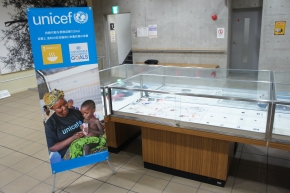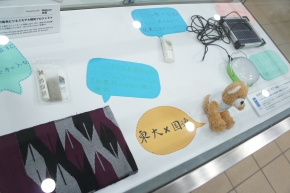Transforming the University from Contributor to the Nation to Servant of the Global Public
The University of Tokyo, which serves the global public through the power of knowledge based on diversity and excellence, has had a deep and longstanding relationship with the United Nations, an international organization that tackles global issues through cooperation among its 193 member states. In the following, we take the opportunity of the 60th anniversary of Japan’s accession to the United Nations to look back on this relationship, which is once again becoming closer.
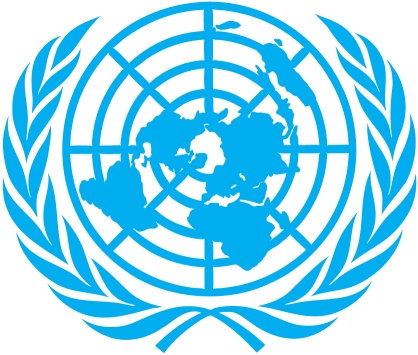
The UN and UTokyo, as Explained by an Associate Professor of UTokyo Who Used to Work for the United Nations
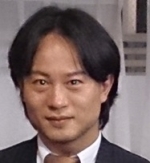
Takashi Izutsu
Project Associate Professor
Division of International Cooperation, Komaba Organization for Educational Excellence
Completed a Doctoral degree (PhD) at the University of Tokyo Graduate School of Medicine. Joined the United Nations Population Fund in 2006 after working at the National Institute of Mental Health. Made efforts to have issues related to mental well-being and disability reflected in the UN’s Sustainable Development Goals (SDGs) as the chief in charge of mental health and disability at the United Nations Secretariat since 2009. Has held present position since 2015. Has also served as a translator for the Disney musicals The Little Mermaid and Aladdin.
In 2014, UN Women Goodwill Ambassador Emma Watson (then aged 24) made a speech at the United Nations that attracted a lot of public attention. Speaking about gender equality, Ms. Watson, an actress famous for her major roles in the Harry Potter movies and Beauty and the Beast, cited a well-known quote when she said: “All that is needed for the forces of evil to triumph is for enough good men and women to do nothing.” She urged all people to take action, saying, “Ask yourself if not me, who? If not now, when?”
The United Nations was founded in the wake of two world wars by a group of nations committed to keeping the peace. It celebrated its 70th anniversary in 2015. In the 60 years since Japan joined the organization, it has been elected as a non-permanent member of the UN Security Council 11 times, more than any other country. Japan has also been No. 2 for 30 years in terms of its financial support of the UN.
The University of Tokyo has deep ties with the UN. Of the eight Japanese who have served as Under-Secretaries-General of the United Nations, six are graduates of the University, including Yasushi Akashi, who was the first Japanese person to become a staff member of the UN, and Yukio Takasu, the current Under-Secretary-General for Management. Furthermore, many of the University’s graduates have worked as executives and other staff members of the UN system, including Director General Yukiya Amano of the International Atomic Energy Agency. In addition, many UTokyo alumni have made contributions to the UN as diplomats and representatives of civil society. During their time as UN Secretary-General, both Kofi Annan and Ban Ki-moon visited the University to engage with students. Moreover, the University has been carrying out a range of initiatives to deepen its ties with the international body, including educational activities such as excursions to and lectures on the UN; sharing of advanced research results with the organization; and other activities conducted by students.
In 2017, António Guterres, former Prime Minster of Portugal and former UN High Commissioner for Refugees, was newly appointed to lead the UN as Secretary-General. On taking the oath of office, Mr. Guterres made a speech in which he said, “Fear is driving the decisions of many people around the world. We must understand their anxieties and meet their needs [...] to work together to move from fear of each other, to trust in each other.” In the Sustainable Development Goals (SDGs) set as the UN’s priority development targets for 2030, focus was placed on “leaving no one behind.” Thus, in light of the fact that marginalized groups, such as refugees, internally displaced people, women, children, migrants, persons with disabilities, older persons, indigenous peoples, and LGBT individuals, are facing serious situations in many countries, the international community has agreed to pay special attention to those furthest behind.
Dag Hammarskjöld, who became the second UN Secretary-General at the age of 47 and was killed in a plane crash while on a peace-building mission, said that “the United Nations was not created in order to bring us to heaven, but in order to save us from hell.” This is an idea the UN has now returned to. Moreover, as hinted at by the new Secretary-General with his reference to “fear,” the international organization needs to shift its focus from military and monetary issues to look at the mental well-being of people and to create a society based on this new indicator. The UNESCO Constitution says that “since wars begin in the minds of men, it is in the minds of men that the defenses of peace must be constructed,” and humanity must strive to do so.
The individuals who can help the world create this peace are those who are willing to reach out to people in difficult situations rather than teaming up with the stronger side; those who pay attention not only to tangible things such as infrastructure and physical issues but also to people’s feelings and background factors; and those who have respect for both their culture and the cultures of others. Having now returned to the University of Tokyo to teach a class on the United Nations, I feel assured that many of my students are such people.
Project Associate Professor
Division of International Cooperation, Komaba Organization for Educational Excellence
Completed a Doctoral degree (PhD) at the University of Tokyo Graduate School of Medicine. Joined the United Nations Population Fund in 2006 after working at the National Institute of Mental Health. Made efforts to have issues related to mental well-being and disability reflected in the UN’s Sustainable Development Goals (SDGs) as the chief in charge of mental health and disability at the United Nations Secretariat since 2009. Has held present position since 2015. Has also served as a translator for the Disney musicals The Little Mermaid and Aladdin.
In 2014, UN Women Goodwill Ambassador Emma Watson (then aged 24) made a speech at the United Nations that attracted a lot of public attention. Speaking about gender equality, Ms. Watson, an actress famous for her major roles in the Harry Potter movies and Beauty and the Beast, cited a well-known quote when she said: “All that is needed for the forces of evil to triumph is for enough good men and women to do nothing.” She urged all people to take action, saying, “Ask yourself if not me, who? If not now, when?”
The United Nations was founded in the wake of two world wars by a group of nations committed to keeping the peace. It celebrated its 70th anniversary in 2015. In the 60 years since Japan joined the organization, it has been elected as a non-permanent member of the UN Security Council 11 times, more than any other country. Japan has also been No. 2 for 30 years in terms of its financial support of the UN.
The University of Tokyo has deep ties with the UN. Of the eight Japanese who have served as Under-Secretaries-General of the United Nations, six are graduates of the University, including Yasushi Akashi, who was the first Japanese person to become a staff member of the UN, and Yukio Takasu, the current Under-Secretary-General for Management. Furthermore, many of the University’s graduates have worked as executives and other staff members of the UN system, including Director General Yukiya Amano of the International Atomic Energy Agency. In addition, many UTokyo alumni have made contributions to the UN as diplomats and representatives of civil society. During their time as UN Secretary-General, both Kofi Annan and Ban Ki-moon visited the University to engage with students. Moreover, the University has been carrying out a range of initiatives to deepen its ties with the international body, including educational activities such as excursions to and lectures on the UN; sharing of advanced research results with the organization; and other activities conducted by students.
In 2017, António Guterres, former Prime Minster of Portugal and former UN High Commissioner for Refugees, was newly appointed to lead the UN as Secretary-General. On taking the oath of office, Mr. Guterres made a speech in which he said, “Fear is driving the decisions of many people around the world. We must understand their anxieties and meet their needs [...] to work together to move from fear of each other, to trust in each other.” In the Sustainable Development Goals (SDGs) set as the UN’s priority development targets for 2030, focus was placed on “leaving no one behind.” Thus, in light of the fact that marginalized groups, such as refugees, internally displaced people, women, children, migrants, persons with disabilities, older persons, indigenous peoples, and LGBT individuals, are facing serious situations in many countries, the international community has agreed to pay special attention to those furthest behind.
Dag Hammarskjöld, who became the second UN Secretary-General at the age of 47 and was killed in a plane crash while on a peace-building mission, said that “the United Nations was not created in order to bring us to heaven, but in order to save us from hell.” This is an idea the UN has now returned to. Moreover, as hinted at by the new Secretary-General with his reference to “fear,” the international organization needs to shift its focus from military and monetary issues to look at the mental well-being of people and to create a society based on this new indicator. The UNESCO Constitution says that “since wars begin in the minds of men, it is in the minds of men that the defenses of peace must be constructed,” and humanity must strive to do so.
The individuals who can help the world create this peace are those who are willing to reach out to people in difficult situations rather than teaming up with the stronger side; those who pay attention not only to tangible things such as infrastructure and physical issues but also to people’s feelings and background factors; and those who have respect for both their culture and the cultures of others. Having now returned to the University of Tokyo to teach a class on the United Nations, I feel assured that many of my students are such people.
Advancing Cooperation with the United Nations
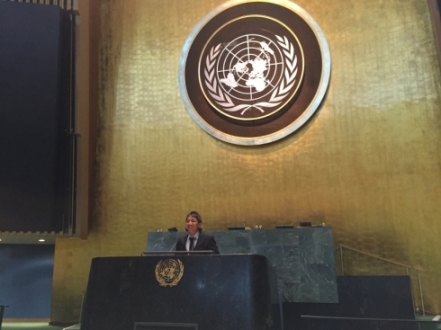
Participation in the “United Nations Academic Impact”
The United Nations Academic Impact represents a partnership between the United Nations and institutions of higher education around the world. With a focus on SDGs and other UN activities, the Impact is designed to advance cooperation among the world’s higher education institutions as well as between such institutions and the UN. The University of Tokyo joined the initiative in February 2016 and has begun conducting activities to support and foster the implementation of the 10 basic principles of the Academic Impact, which include a “commitment to the principles inherent in the United Nations Charter” and a “commitment to educational opportunity for all people regardless of gender, race, religion or ethnicity.”
Intensive Seminar in NY: “UN and Culture”
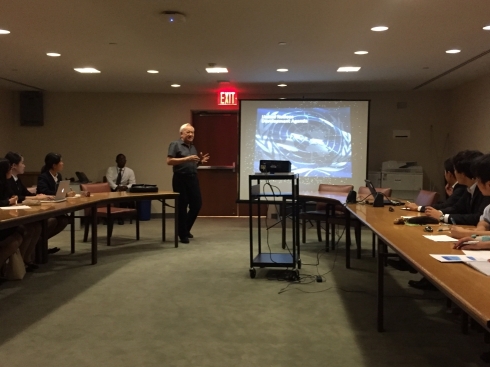
Seminar at Komaba: “UN and Inclusion”
This seminar took place in the semester that started in September 2016. With a focus on “leaving no one behind,” the major theme of the SDGs, multiple lectures were given and a group discussion was conducted on the topic of the “inclusion” of people with mental health conditions and psychosocial disabilities, a group that tends to be particularly neglected. Lecturers for the seminar included representatives of related international organizations, the Japanese Network of People Living with HIV/AIDS, and associations of persons with mental health conditions and psychosocial disabilities.UN-related Activities Conducted by Students
UNiTe: Student Association Connecting UTokyo with the UN
This association was launched by students who were inspired by their visit to the UN headquarters as part of the Intensive Seminar “UN and Culture” introduced above. The association aims to forge a connection between the University of Tokyo and the UN by publicizing the SDGs. In December 2016, it held an exhibition on the theme of “UTokyo x UN” in the library of the Komaba Campus, displaying mosquito nets used in Africa, caps worn by UN staff, and various other items actually used in UN activities.The Komaba Model United Nations: Simulating International Conferences
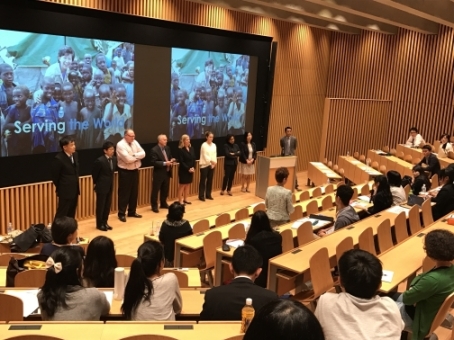
A Selection of Graduates Who Have Worked in Service to the United Nations
Composed of six principal organs and various subsidiary organs, the United Nations also partners with a number of specialized agencies and employs a range of people. Of the roughly 32,000 people working for UN-related organizations in professional and higher positions, Japanese people account for about 2.5% (790 persons) of the total (as of 2013, according to UN report CEB/2014/HLCM/HR/21). Japan ranks No. 2 in terms of financial contribution by nation and No. 7 in terms of the number of people working for the UN. There is no data by university available, but according to Project Associate Professor Izutsu, graduates from the University of Tokyo, along with those from International Christian University and Sophia University, account for a large number of the Japanese people working for the UN. Many graduates of the University, starting with Mr. Akashi, have worked at the UN. And many more will continue to do so.
Graduates who have served as UN Under-Secretary-Generals
Graduates who have headed UN organizations
(Some of) the graduates who have held positions such as Assistant Secretary-General
(Some of) the graduates currently working at the UN
Note: This article was originally printed in Tansei 34 (Japanese language only). All information in this article is as of March 2017.


